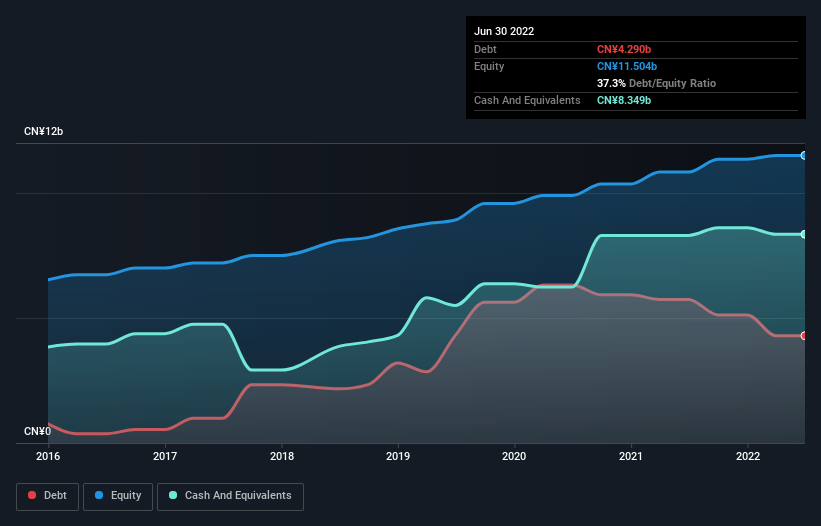The external fund manager backed by Berkshire Hathaway's Charlie Munger, Li Lu, makes no bones about it when he says 'The biggest investment risk is not the volatility of prices, but whether you will suffer a permanent loss of capital.' So it might be obvious that you need to consider debt, when you think about how risky any given stock is, because too much debt can sink a company. We note that Baoye Group Company Limited (HKG:2355) does have debt on its balance sheet. But is this debt a concern to shareholders?
Why Does Debt Bring Risk?
Debt assists a business until the business has trouble paying it off, either with new capital or with free cash flow. If things get really bad, the lenders can take control of the business. While that is not too common, we often do see indebted companies permanently diluting shareholders because lenders force them to raise capital at a distressed price. By replacing dilution, though, debt can be an extremely good tool for businesses that need capital to invest in growth at high rates of return. The first step when considering a company's debt levels is to consider its cash and debt together.
Check out our latest analysis for Baoye Group
What Is Baoye Group's Net Debt?
As you can see below, Baoye Group had CN¥4.29b of debt at June 2022, down from CN¥5.74b a year prior. But it also has CN¥8.35b in cash to offset that, meaning it has CN¥4.06b net cash.

How Healthy Is Baoye Group's Balance Sheet?
According to the last reported balance sheet, Baoye Group had liabilities of CN¥36.6b due within 12 months, and liabilities of CN¥1.06b due beyond 12 months. On the other hand, it had cash of CN¥8.35b and CN¥12.9b worth of receivables due within a year. So its liabilities total CN¥16.4b more than the combination of its cash and short-term receivables.
The deficiency here weighs heavily on the CN¥2.05b company itself, as if a child were struggling under the weight of an enormous back-pack full of books, his sports gear, and a trumpet. So we definitely think shareholders need to watch this one closely. After all, Baoye Group would likely require a major re-capitalisation if it had to pay its creditors today. Given that Baoye Group has more cash than debt, we're pretty confident it can handle its debt, despite the fact that it has a lot of liabilities in total.
The modesty of its debt load may become crucial for Baoye Group if management cannot prevent a repeat of the 23% cut to EBIT over the last year. When a company sees its earnings tank, it can sometimes find its relationships with its lenders turn sour. The balance sheet is clearly the area to focus on when you are analysing debt. But it is Baoye Group's earnings that will influence how the balance sheet holds up in the future. So when considering debt, it's definitely worth looking at the earnings trend. Click here for an interactive snapshot.
But our final consideration is also important, because a company cannot pay debt with paper profits; it needs cold hard cash. Baoye Group may have net cash on the balance sheet, but it is still interesting to look at how well the business converts its earnings before interest and tax (EBIT) to free cash flow, because that will influence both its need for, and its capacity to manage debt. In the last three years, Baoye Group's free cash flow amounted to 44% of its EBIT, less than we'd expect. That's not great, when it comes to paying down debt.
Summing Up
Although Baoye Group's balance sheet isn't particularly strong, due to the total liabilities, it is clearly positive to see that it has net cash of CN¥4.06b. Despite its cash we think that Baoye Group seems to struggle to handle its total liabilities, so we are wary of the stock. Over time, share prices tend to follow earnings per share, so if you're interested in Baoye Group, you may well want to click here to check an interactive graph of its earnings per share history.
At the end of the day, it's often better to focus on companies that are free from net debt. You can access our special list of such companies (all with a track record of profit growth). It's free.
Valuation is complex, but we're here to simplify it.
Discover if Baoye Group might be undervalued or overvalued with our detailed analysis, featuring fair value estimates, potential risks, dividends, insider trades, and its financial condition.
Access Free AnalysisHave feedback on this article? Concerned about the content? Get in touch with us directly. Alternatively, email editorial-team (at) simplywallst.com.
This article by Simply Wall St is general in nature. We provide commentary based on historical data and analyst forecasts only using an unbiased methodology and our articles are not intended to be financial advice. It does not constitute a recommendation to buy or sell any stock, and does not take account of your objectives, or your financial situation. We aim to bring you long-term focused analysis driven by fundamental data. Note that our analysis may not factor in the latest price-sensitive company announcements or qualitative material. Simply Wall St has no position in any stocks mentioned.
About SEHK:2355
Baoye Group
Provides construction services in the People’s Republic of China.
Excellent balance sheet average dividend payer.
Market Insights
Community Narratives



